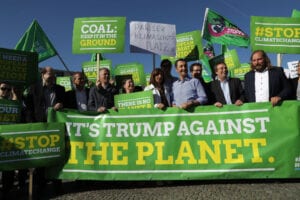The record continues to grow of China’s influence on Western institutions, which the Chinese deploy to advance China’s interests. Recent high-profile examples include ties to academic researchers who then lie about their relationship with Chinese underwriters, and agents for China serving as aides or fundraisers for, and, purportedly romantic interests of, elected officials.
Author Rupert Darwall has specifically explored how China is using the “green” agenda to gain advantage over America, including through its influence with environmental pressure groups. Patricia Adams detailed this further in an early December 2020 report published by the United Kingdom’s Global Warming Policy Foundation (GWPF).
 Loading...
Loading...
Both conclude that Western green groups serve as “China’s propagandists” while turning blind eyes to China’s own environmental and human rights record which – according to the Greens’ expressed standards – would otherwise be subject to strident condemnation and pressure campaigns.
Instead, China is oddly praised by Western environmentalist groups. One wonders if this is related to the fact the groups require special approval from the state to operate within the communist country.
Darwall argues that, taking all of these machinations into account, the climate change issue has become “a national security threat – but not in the way the national security elite assumes.” That is to say, “For China, climate change offers a strategic opportunity. Decarbonizing the rest of the world makes China’s economy stronger – it weakens its rivals’ economies, reduces the cost of energy for its hydrocarbon-hungry economy, and sinks energy-poor India as a potential Indo-Pacific rival.”
For example, already, litigants in the United States have cited the Paris Climate Agreement as requiring judicial commandeering of energy and environmental policy from the political branches, leaving judges to decide what economic development may occur and how. This past summer, the U.K. Court of Appeal blocked major transportation infrastructure construction citing among the reasons that such projects are incompatible with the Paris commitments.

As China cheers...
Expect more such mischief, via proxies for China, in the United Nations “Climate Conciliation Commissions” which await the U.S. if it “re-joins” the Paris climate agreement as Joe Biden vows to do.
This is one of many reasons President Trump should recognize Paris as the treaty it obviously is, by transmitting it to the Senate for the required “advice and consent” before the U.S. can be bound in any way.
Even Sen. Lindsey Graham Tweeted in favor of such a move, adding, “As currently drafted, the accord is a big win for China and India.”
Graham had been silent on the issue even as President Obama showed “disturbing contempt for the Senate’s constitutional rights and responsibilities” by declaring an obvious treaty to be something he could commit the U.S. to on his own. Indeed, records obtained under Freedom of Information Act (FOIA) litigation show Graham – one of three original sponsors of “cap-and-trade” legislation in the Senate until it became obvious this was not in his political interests – was targeted by then-Secretary of State John Kerry as a possible supporter of the Paris deal, along with climate obsessive Sen. Sheldon Whitehouse.
No longer. China’s scheming has become too aggressive to further ignore.
Still other FOIA’d emails revealed dealings among Western greens and the Obama-Biden State Department, an apparent business as usual that is likely to soon resume. For example, one April 15, 2015 email, sent by the then-Global Director of the World Resources Institute (WRI) Climate Program to State Department officials, candidly stated the role the WRI played in assisting China to develop the post-Obama “climate” world in Washington, D.C.
Other emails show the Obama State Department leapt at the invitation to help the WRI help China, arranging team-wide conference calls and other follow-up.
In light of this and other revelations, in 2018 the U.S. House of Representatives Committee on Natural Resources sent two oversight letters to WRI and other groups including NRDC, from which Biden has chosen his domestic "climate czar" Gina McCarthy (letters since scrubbed from the website by the new Democratic Chairman). Investigators pressed for clarity on apparent contradictions involving the group’s claims about its relationship with the Chinese government, and how that impacts its political activities within the United States.
The Committee specifically referenced the Foreign Agents Registration Act (FARA), which requires anyone acting as an agent of foreign principals “in a political or quasi-political capacity” to formally report that relationship and all “activities, receipts, and disbursements in support of those activities."

Somebody's watching.
The green groups lawyered up with white-collar defense teams, the 2018 elections brought a new House majority, and the inquiries died. Still, one commentator observed that special counsel Robert Mueller “opened the door to more intense scrutiny of some U.S. environmental groups” by invoking FRA to pursue prosecution of former Trump campaign officials.
Given the influence these groups have in Washington generally, and particularly with Democrats, the precedent of invoking FARA to pursue all things Trump does not translate to pursuit of environmentalist pressure groups, as well, despite a clear record of involvement with, and even boasting of their ties to, China on matters of U.S. policy.
The foreign-agents act, like other statutes, appears to be merely a political weapon, intended only for those who threaten “the way things work” in Washington. And among the lessons of 2020 is that the way things work in Washington, as in academia and other institutions, is under substantial Chinese influence.
Article tags: China, Green Movement, Green New Deal
That's good for you But for those who can't afford the solar panels or who don't own houses:
Net metering structures threaten today’s electrical grid system by allowing solar customers to bypass grid
maintenance costs, as well as by imposing additional operating stresses given that grids must transition
from a 1-way power flow, from centralized generators to users, to a decentralized, 2-way power flow—a
task that electrical grids are not built to handle given the current infrastructure.
The retail price under many states’ net metering schemes is often much higher than the rate that grids could reasonably obtain in the wholesale power market, creating immense distortions in the energy market that incentivize inefficient forms of solar energy production technology, often at the expense of taxpayers and non-solar electricity users.
As net metering schemes continue to pay out elevated rates to solar customers, the amount paid back by
net metering customers is often below utilities’ costs for servicing those customers, resulting in higher
amounts charged to non-net metered customers—the result is doubly regressive, as non-solar customers,
who are often less well-off, must cross subsidize solar customers, who are generally wealthier.
Solar energy job creation estimates do not take into account the effects stemming from any offsetting impact of these distortionary subsidies, thereby failing to account for jobs lost or foregone as a result of government support of solar energy.
The current subsidization structure of solar energy facilitates market distortions by taking capital away from more efficient forms of energy production and by unevenly distributing the costs of these distortions.
It's a ponzi scheme and can't support itself.
Beat these power prices:
Los Angeles solicits record solar + storage deal at 1.997/1.3-cents kWh
https://www.utilitydive.com/news/los-angeles-solicits-record-solar-storage-deal-at-199713-cents-kwh/558018/
I am the canary in your coalmine. Being a former engineer for a large power company and having earned a Master of Science in Energy and the Environment, I had PV panels installed five years ago, with my estimated payback of 15-17 years, . . the right thing for an eco-freak to do. Before they could be installed, we acquired a VW e-Golf electric car. The savings in gasoline alone took the solar system payback down to 3 1/2 years. So, we added a used Tesla Model S, P85, and that took the payback down to less than three years, which means we now get free power for household and transportation.
But that is not all: We do not need to go to gas stations, we fuel up at home at night with cheap baseload power. During the daytime, the PV system turns our meter backwards powering the neighborhood with clean local power, which we trade for the stuff to be used that night. If we paid for transportation fuel, the VW would cost us 4 cents/mile to drive, and the Tesla would cost 5 cents/mile at California off-peak power prices.
No oil changes are a real treat along with no leaks. And since it has an electric motor, it needs NO ENGINE MAINTENANCE at all. We do not go "gas up", or get tune-ups or emissions checks, have no transmission about which to worry, no complicated machined parts needing care.
The future is already here, and it is clean and inexpensive.